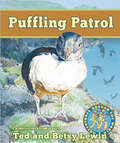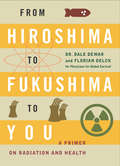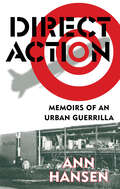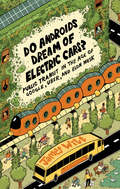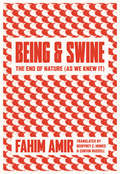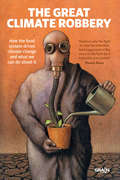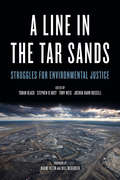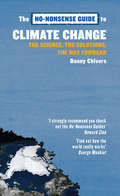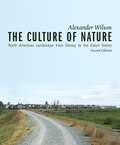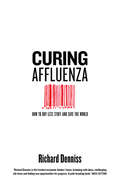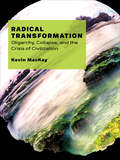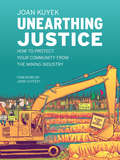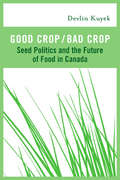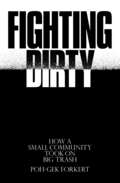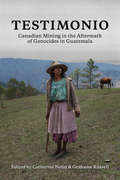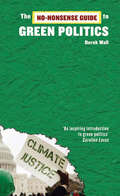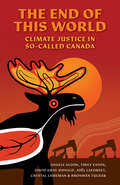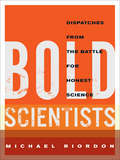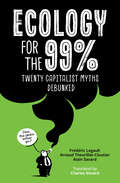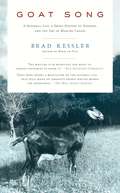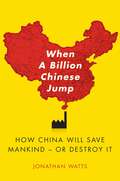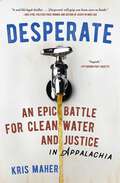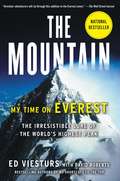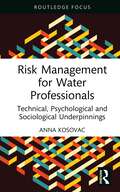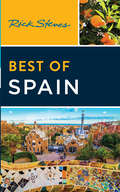- Table View
- List View
Puffling Patrol (Adventures Around the World)
by Ted Lewin Betsy LewinTed and Betsy Lewin travel to Iceland to learn about the "Puffling Patrol," a group of children who rescue lost puffins and return them to sea.Every April, the Westman Islands off the coast of Iceland become home to hundreds of thousands of puffins, small black-and-white seabirds with colorful bills. They spend the summer on the rocky cliffs of the islands, caring for their newly hatched chicks. By the middle of August, it is time for the young puffins, called pufflings, to make their way to the sea. And that is when the children of The Puffling Patrol are called to action. Ted and Betsy Lewin have journeyed to the Westman Islands to experience The Puffling Patrol's endeavors firsthand. In the company of Erna, Dáni, and their father, they drive through town at night, carefully searching for confused little birds that have glided down onto the streets instead of out to sea. Will the children find the pufflings before the birds encounter danger? Will the pufflings ever make it to the sea to spend their lives with other puffins in the North Atlantic Ocean? The fascinating story of this unique annual rescue, combined with Ted Lewin's dramatic paintings and Betsy Lewin's lively field sketches, is sure to make Puffling Patrol a hit with animal lovers of all ages.
From Hiroshima to Fukushima to You: A Primer on Radiation and Health
by Dale Dewar Florian OelckThe bombing of Hiroshima on August 6, 1945, brought radiation to international attention but the exact nature of what had been unleashed was still unclear to most. The 1986 meltdown at the Chernobyl nuclear plant again made headlines with estimates of fatalities ranging from 4000 to almost a million deaths. By the time of the shocking 2011 disaster at the Fukushima nuclear plant social media meant governments and corporations no longer had a monopoly over the release of information, but transparency remains low on the agenda. Meanwhile, few physicians give thought to the delayed health effects of radiation. It has been the bold physician who has challenged the potential overuse of chest X-rays, CT scanning, or PET scans. This book provides clear and accurate information about radiation so that we can all make informed choices. In clear language it offers answers to citizens’ questions: What is radiation? Where do we encounter it? What are the benefits and risks? How do we develop a responsible future around the uses and abuses of radioactivity?
Direct Action: Memoirs of an Urban Guerrilla
by Ann HansenAnn Hansen stood trial as one of the so-called “Squamish Five.” Sentenced to life in prison, she served seven years. Now she tells her story for the first time. Direct Action captures the excitement and indignation of the counterculture of the early ’80s. Missile tests were fuelling a new arms race. Reckless megaprojects threatened the global environment. Alienation, punk rock, and militancy were on the rise. Hansen and her fellow urban guerrillas believed that sabotaging government and corporate property could help turn things around. To prove their point, they bombed the Litton Systems plant in Toronto, where components for Cruise Missiles were being made. Hansen’s book poses unresolved ethical dilemmas. In light of the recent explosion of anti-globalization protests, Direct Action mirrors the resurgence of militant activity around the world.
Do Androids Dream of Electric Cars?: Public Transit in the Age of Google, Uber, and Elon Musk
by James WiltPublic transportation is in crisis. Through an assessment of the history of automobility in North America, the “three revolutions” in automotive transportation, as well as the current work of committed people advocating for a different way forward, James Wilt imagines what public transit should look like in order to be green and equitable. Wilt considers environment and climate change, economic and racial inequality, urban density, accessibility and safety, work and labour unions, privacy and control of personal data, as well as the importance of public and democratic decision-making. Based on interviews with more than forty experts, including community activists, academics, transit planners, authors, and journalists, Do Androids Dream of Electric Cars? explores our ability to exert power over how cities are built and for whom.
Being and Swine: The End of Nature (As We Knew It)
by Fahim AmirForget everything you think you know about nature. Fahim Amir’s award-winning book takes pure delight in posing unexpected questions: Are animals victims of human domination, or heroes of resistance? Is nature pristine and defenceless, or sentient and devious? Is being human really a prerequisite for being political? In a world where birds on Viagra punch above their weight and termites hijack the heating systems of major cities, animals can be recast as vigilantes, agitators, and public enemies in their own right. Under Amir’s magic spell, pigs transform from slaughterhouse innocents into rioting revolutionaries, pigeons from urban pests into unruly militants, honeybees from virtuous fuzzballs into shameless centrefold models for eco-capitalism. As paws, claws, talons, and hooves seize the means of production, Being and Swine spirals higher and higher into a heady thesis that becomes more convincing by the minute. At the heart of Amir’s writing is a deep optimism and bracingly fresh reading of Marxist, post-colonial, and feminist theory, building upon the radical scholarship of Donna J. Haraway and others. Contrarian, whip-smart, and wildly innovative, no other book will laugh at your convictions quite like this one.
The Great Climate Robbery: How the Food System Drives Climate Change and What We Can Do About It
by GRAINThe Great Climate Robbery connects analysis of the food system to larger issues affecting the planet, and link peoples’ struggles over food to climate change. This book will help readers to understand the ways in which corporations control the food system and provide the analysis needed to challenge this control.
A Line in the Tar Sands: Struggles for Environmental Justice
by Black, Toban; D'Arcy, Stephen; Weis, Tony; Kahn Russell, Joshua; Klein, Naomi; McKibben, BillTar sands “development” comes with an enormous environmental and human cost. But tar sands opponents—fighting a powerful international industry—are likened to terrorists; government environmental scientists are muzzled; and public hearings are concealed and rushed. Yet, despite the formidable political and economic power behind the tar sands, many opponents are actively building international networks of resistance, challenging pipeline plans while resisting threats to Indigenous sovereignty and democratic participation. Featuring contributions from Winona LaDuke, Bill McKibben, Naomi Klein, Clayton Thomas-Muller, Harsha Walia, Jeremy Brecher, Crystal Lameman, Melina Laboucan-Massimo, Yves Engler, Cherri Foytlin, Macdonald Stainsby, Yudith Nieto, Greg Albo, Brian Tokar, Jesse Cardinal, Rex Weyler, Jess Worth, and many more. The editors’ proceeds from this book will be donated to frontline grassroots environmental justice groups and campaigns.
No-Nonsense Guide to Climate Change: The Science, the Solutions, the Way Forward (No-Nonsense Guides #3)
by Danny ChiversJust as the need for action on climate change becomes more urgent and overwhelming, the campaign to deny that humans are causing it has gained more traction. This completely new book meets the skeptics head on, offering a guide to the science, an insight into the politics of climate justice and a clear sense of the way forward. This is an ideal offering for students, academics and anyone interested in the growing issue of society’s impact on climate change and how to make climate justice a reality.
The Culture of Nature: North American Landscape from Disney to Exxon Valdez
by Alexander WilsonSince it was first published in 1991, few books have come close to capturing the depth and breadth of Alexander Wilson’s innovative ecocultural compendium The Culture of Nature. His work was one of the first of its kind to investigate the ideology of the environment, to critique the future according to Disney, and illustrate that the ways we think, teach, talk about, and construct the natural world are as important a terrain as the land itself. Extensively illustrated and meticulously researched, this edition is exquisitely revised and reissued for the Anthropocene.
Curing Affluenza: How to Buy Less Stuff and Save the World
by Richard DennissAffluenza has not just changed the world, it has also changed the way we see the world. Short of money? Borrow some. Caught in the rain? Buy an umbrella. Thirsty? Buy a bottle of water and throw the bottle away. Our embrace of “convenience” and our acceptance of our inability to plan ahead is an entirely new way of thinking, and over the past seventy years we have built a new and different economic system to accommodate it. There is nothing inevitable about this current way of thinking, consuming, and producing. On the contrary, the vast majority of humans who have ever lived would find the idea of using our scarce resources to produce things that are designed to be thrown away absolutely senseless. The fact that our consumer culture is a recent innovation does not mean it will be easy to change. Indeed, the last few decades have shown how contagious affluenza can be. But we have not always lived this way, which proves that we don’t have to persist with it. We can change—if we want to.
Radical Transformation: Oligarchy, Collapse, and the Crisis of Civilization
by Kevin MacKayRadical Transformation is a story about industrial civilization’s impending collapse, and about the possibilities of averting this fate. Human communities first emerged as egalitarian, democratic groups that existed in symbiotic relationship with their environments. Increasing complexity led to the emergence of oligarchy, in which societies became captive to the logic of domination, exploitation, and ecological destruction. The challenge facing us today is to build a movement that will radically transform civilization and once more align our evolutionary trajectory in the direction of democracy, equality, and ecological sustainability.
Unearthing Justice: How to Protect Your Community from the Mining Industry
by Joan KuyekThe mining industry continues to be at the forefront of colonial dispossession around the world. It controls information about its intrinsic costs and benefits, propagates myths about its contribution to the economy, shapes government policy and regulation, and deals ruthlessly with its opponents. Brimming with case studies, anecdotes, resources, and illustrations, Unearthing Justice exposes the mining process and its externalized impacts on the environment, Indigenous Peoples, communities, workers, and governments. But, most importantly, the book shows how people are fighting back. Whether it is to stop a mine before it starts, to get an abandoned mine cleaned up, to change laws and policy, or to mount a campaign to influence investors, Unearthing Justice is an essential handbook for anyone trying to protect the places and people they love.
Good Crop / Bad Crop: Seed Politics and the Future of Food in Canada
by Devlin KuyekIN RECENT YEARS Canadians have become more and more concerned about the origins oftheir food and the environmental impacts of pesticides in agriculture. What is less well knownis that pesticide corporations such as Monsanto and Du Pont have bought their way into the seed industry and are taking control of what was once the exclusive domain of farmers.In Good Crop / Bad Crop, Devlin Kuyek deftly examines the economic and environmental background of the modern seed trade from a Canadian perspective. Historically seeds were viewed more as public goods than as commodities, and plant breeding objectives were widely shared by scientists, governments, and farmers. Now that approach is changing; seeds have become increasingly commodified, and plant breeding has become subject to corporate priorities. Farmers and citizens in Canada, Kuyek points out, need to heed the hard-won lessons from the developing world, where farmers greatly damaged by the much-heralded approaches of theGreen Revolution are now taking steps to reclaim control over seed supplies, food security, and their futures.
Fighting Dirty: How a Small Community Took on Big Trash
by Poh-Gek ForkertFighting Dirty tells the story of how one small group of farmers, small-town residents, and Indigenous people fought the world’s largest waste disposal company to stop them from expanding a local dumpsite into a massive landfill. As one of the experts brought in to assess the impact the toxic waste would have on the community, Poh-Gek Forkert was part of the adventures and misadventures of their decades-long fight.
Testimonio: Canadian Mining in the Aftermath of Genocides in Guatemala
by Catherine Nolin Grahame RussellWhat is land? A resource to be exploited? A commodity to be traded? A home to cherish? In Guatemala, a country still reeling from thirty-six years of US-backed state repression and genocides, dominant Canadian mining interests cash in on the transformation of land into “property,” while those responsible act with near-total impunity. Editors Catherine Nolin and Grahame Russell draw on over thirty years of community-based research and direct community support work in Guatemala to expose the ruthless state machinery that benefits the Canadian mining industry—a staggeringly profitable juggernaut of exploitation, sanctioned and supported every step of the way by the Canadian government. This edited collection calls on Canadians to hold our government and companies fully to account for their role in enabling and profiting from violence in Guatemala. The text stands apart in featuring a series of unflinching testimonios (testimonies) authored by Indigenous community leaders in Guatemala, as well as wide-ranging contributions from investigative journalists, scholars, lawyers, activists, and documentarians on the ground. As resources are ripped from the earth and communities and environments ripped apart, the act of standing in solidarity and bearing witness—rather than extracting knowledge—becomes more radical than ever.
No-Nonsense Guide to Green Politics (No-Nonsense Guides #13)
by Derek WallClimate chaos and pollution, deforestation and consumerism: the crisis facing human civilization is clear enough. But the response of politicians has been cowardly and inadequate, while environmental activists have tended to favour single-issue campaigns rather than electoral politics. The No-Nonsense Guide to Green Politics measures the rising tide of eco-activism and awareness and explains why this event heralds a new political era worldwide: in the near futurethere will be no other politics but green politics.
The End of This World: Climate Justice in So-Called Canada
by Angele Alook Emily Eaton David Gray-Donald Joël Laforest Crystal Lameman Bronwen TuckerThe climate crisis is here, and the end of this world—a world built on land theft, resource extraction, and colonial genocide—is on the horizon. In this compelling roadmap to a livable future, Indigenous sovereignty and climate justice go hand in hand. Drawing on their work in Indigenous activism, the labour movement, youth climate campaigns, community-engaged scholarship, and independent journalism, the six authors challenge toothless proposals and false solutions to show that a just transition from fossil fuels cannot succeed without the dismantling of settler capitalism in Canada. Together, they envision a near future where oil and gas stay in the ground; where a caring economy provides social supports for all; where wealth is redistributed from the bloated billionaire class; and where stolen land is rightfully reclaimed under the jurisdiction and sovereignty of Indigenous peoples. Packed with clear-eyed analysis of both short- and long-term strategies for radical social change, The End of This World promises that the next world is within reach and worth fighting for.
Bold Scientists: Dispatches from the Battle for Honest Science
by Michael RiordonAs governments and corporations scramble to pull the plug on research that proves that they are poisoning our planet and rush to muzzle the scientists who dare to share their disturbing data, it seems the powerful have declared a war on science. Michael Riordon asks deep questions of bold scientists who defy the status quo including: an Indigenous biologist who integrates traditional knowledge and a trickster’s wit; an engineering professor who exposes the myths and dangers of fracking; a forensic geneticist who traces children stolen by the military in El Salvador; a sociologist who investigates the lure and threat of mass surveillance; a radical psychologist who confronts psychiatry’s dangerous power; and a young marine biologist who risks her career to defend science and democracy. Who controls science and at what cost to the earth and its inhabitants? Can we change? This is unspun science for dangerous times.
Ecology for the 99%: Twenty Capitalist Myths Debunked
by Frédéric Legault Arnaud Theurillat-Cloutier Alain SavardIf everyone—from Emmanuel Macron to Jeff Bezos, and even Coca Cola—is green, why is the environmental crisis growing at an alarmingly rapid rate? The world is already experiencing the impact of climate crisis, but we are not equally responsible for its violent effects. Some of those who claim to be helping the planet are actually making things worse. To avoid being duped by false allies and to create an ecology for the 99%, we must discuss a radical topic: the exit from capitalism. Ecology for the 99% provides inspiration for building grassroots environmental movements through a lively discussion of the most persistent capitalist myths. It presents compelling evidence for why carbon market policies will fail, why a capitalist economy cannot be based on renewable energy sources, and why we should be protesting against overproduction, not overconsumption. Ecology for the 99% is an antidote to apathy and a bulwark against false leads. Time is running out, we can’t afford to take any wrong turns.
Goat Song: A Seasonal Life, a Short History of Herding, and the Art of Making Cheese
by Brad KesslerAcclaimed novelist Brad Kessler lived in New York City but longed for a life on the land where he could grow his own food. After years of searching for a home, he and his wife, photographer Dona Ann McAdams, found a mountain farmhouse on a dead-end road, with seventy-five acres of land. One day, when Dona returned home with fresh goat milk from a neighbor's farm, Kessler made a fresh chèvre, and their life changed forever. They decided to raise dairy goats and make cheese. Goat Song tells about what it's like to live intimately with animals who directly feed you. As Kessler begins to live the life of a herder -- learning how to care for and breed and birth goats -- he encounters the pastoral roots of so many aspects of Western culture. Kessler reflects on the history and literature of herding, and how our diet, our alphabet, our religions, poetry, and economy all grew out of a pastoralist milieu among hoofed animals. Kessler and his wife adapt to a life governed by their goats and the rhythm of the seasons. And their goats give back in immeasurable ways, as Kessler proves to be a remarkable cheesemaker, with his first tomme of goat cheese winning lavish praise from America's premier cheese restaurants. In the tradition of Thoreau's Walden and Annie Dillard's Pilgrim at Tinker Creek, Goat Song is both a spiritual quest and a compelling and beautiful chronicle of living by nature's rules.
When A Billion Chinese Jump: How China Will Save Mankind—Or Destroy It
by Jonathan WattsAs a young child, Jonathan Watts believed if everyone in China jumped at the same time, the earth would be shaken off its axis, annihilating mankind. Now, more than thirty years later, as a correspondent for The Guardian in Beijing, he has discovered it is not only foolish little boys who dread a planet-shaking leap by the world’s most populous nation. When a Billion Chinese Jump is a road journey into the future of our species. Traveling from the mountains of Tibet to the deserts of Inner Mongolia via the Silk Road, tiger farms, cancer villages, weather-modifying bases, and eco-cities, Watts chronicles the environmental impact of economic growth with a series of gripping stories from the country on the front line of global development. He talks to nomads and philosophers, entrepreneurs and scientists, rural farmers and urban consumers, examining how individuals are trying to adapt to one of the most spectacular bursts of change in human history, then poses a question that will affect all of our lives: Can China find a new way forward or is this giant nation doomed to magnify the mistakes that have already taken humanity to the brink of disaster?
Desperate: An Epic Battle for Clean Water and Justice in Appalachia
by Kris MaherSet in Appalachian coal country, this &“superb&” (Pittsburgh Post-Gazette) legal drama follows one determined lawyer as he faces a coal industry giant in a seven-year battle over clean drinking water for a West Virginia community.For two decades, the water in the taps and wells of Mingo County didn&’t look, smell, or taste right. Could the water be the root of the health problems—from kidney stones to cancer—in this Appalachian community? Environmental lawyer Kevin Thompson certainly thought so.For seven years, Thompson waged an epic legal battle against Massey Energy, West Virginia&’s most powerful coal company, helmed by CEO Don Blankenship. While Massey&’s lawyers worked out of a gray glass office tower in Charleston known as &“the Death Star,&” Thompson set up shop in a ramshackle hotel in the fading coal town of Williamson. Working with fellow lawyers and a crew of young activists, Thompson would eventually uncover the ruthless shortcuts that put the community&’s drinking water at risk.Retired coal miners, women whose families had lived in the area&’s coal camps for generations, a respected preacher and his brother, all put their trust in Thompson when they had nowhere else to turn. Desperate is a masterful work of investigative reporting about greed and denial, &“both a case study in exploitation of the little guy and a playbook for confronting it&” (Kirkus Reviews). Maher crafts a revealing portrait of a town besieged by hardship and heartbreak, and an inspiring account of one tenacious environmental lawyer&’s mission to expose the truth and demand justice.
The Mountain: My Time on Everest
by Ed Viesturs David RobertsIn national bestseller The Mountain, world-renowned climber and bestselling author Ed Viesturs and cowriter David Roberts paint a vivid portrait of obsession, dedication, and human achievement in a true love letter to the world’s highest peak.In The Mountain, veteran world-class climber and bestselling author Ed Viesturs—the only American to have climbed all fourteen of the world’s 8,000-meter peaks—trains his sights on Mount Everest in richly detailed accounts of expeditions that are by turns personal, harrowing, deadly, and inspiring.The highest mountain on earth, Everest remains the ultimate goal for serious high-altitude climbers. Viesturs has gone on eleven expeditions to Everest, spending more than two years of his life on the mountain and reaching the summit seven times. No climber today is better poised to survey Everest’s various ascents—both personal and historic. Viesturs sheds light on the fate of Mallory and Irvine, whose 1924 disappearance just 800 feet from the summit remains one of mountaineering’s greatest mysteries, as well as the multiply tragic last days of Rob Hall and Scott Fischer in 1996, the stuff of which Into Thin Air was made.Informed by the experience of one who has truly been there, The Mountain affords a rare glimpse into that place on earth where Heraclitus’s maxim—“Character is destiny”—is proved time and again.
Risk Management for Water Professionals: Technical, Psychological and Sociological Underpinnings (Routledge Focus on Environment and Sustainability)
by Anna KosovacThis book presents a comprehensive view of the different theories of risk management in water, drawing on recent studies that serve to inform the way that practitioners consider their own risk practice.While it is commonplace to see risk described in technical and engineering terms when discussing water, this book argues that this is a flawed practice that results in poor decision-making, particularly where water intersects with social elements and the community. Challenging these traditionally held notions of risk, this book introduces the psychological and sociological underpinnings to water risk decisions. Using these, it argues for a broader view of risk-based thinking and proposes a number of evidence-based actions for policymakers to directly implement. Drawing on primary research conducted with water professionals across a variety of roles, this book highlights how the effect of psychological inputs, such as dread and reputation, can create barriers to implementing novel water solutions or projects. Through understanding the biases covered in this book, water practitioners can work to support processes that seek to encourage new and innovative methods in water management.This book will be of great interest to professionals working in water management, including those in government roles, planning departments and consultancies. It is also a great reference for students of both water resource management and risk studies more generally.
Rick Steves Best of Spain (Rick Steves Travel Guide)
by Rick StevesHit Spain's can't-miss art, sights, and bites in two weeks or less with Rick Steves Best of Spain!Strategic advice from Rick Steves on what's worth your time and money Short itineraries covering Barcelona, Madrid, Toledo, Granada, Andalucía's White Hill Towns, and Sevilla Rick's tips for beating the crowds, skipping lines, and avoiding tourist traps The best of local culture, flavors, and more, including insightful walks through museums, historic sights, and atmospheric neighborhoods Trip planning strategies like how to link destinations and design your itinerary, what to pack, where to stay, and how to get around Over 400 full-color pages with detailed maps and vibrant photos throughout Suggestions for side trips to Montserrat and Figueres, Basque Country, Santiago de Compostela, El Escorial, Segovia, Salamanca, Córdoba, and Spain's South Coast Experience Spain's old world romance and new world excitement for yourself with Rick Steves Best of Spain! Planning a longer trip? Pick up Rick Steves Spain, an in-depth guide perfect for spending more than two weeks exploring Spain.
